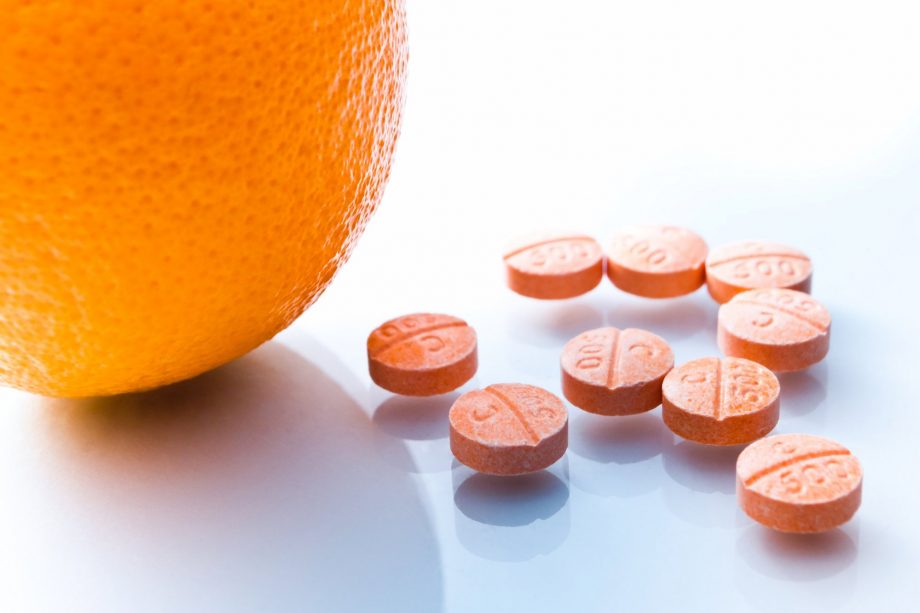How to Prevent Binging with Supplements and Vitamins

We’ve all been there – 3 AM, in front of the fridge, digging into the last of the chocolate ice cream.
Cravings, or simply a very strong desire to munch on a particular food, are nothing out of the ordinary, and everyone has them from time to time.

However, excessive binge eating and extensive difficulty in controlling your appetite might be a sign that something is not quite right. This kind of behavior comes with feelings of guilt and shame, which can often plunge you right back into the pantry – not a pleasant ride.
[box type="info"]
Plenty of people are guilty of overeating at some point or another, but what many people don't realize is that binge eating is something almost entirely different. While going back for seconds, or even thirds, on Thanksgiving Day can definitely leave you filling over-full and less than proud of yourself, binge eating is a disorder where a person literally feels as though they have no choice but to keep piling onto their plate.
Usually, binge eaters will go through episodes where they can't stop themselves from eating more no matter how full or sick they get. And, these binge eaters typically don't do so in public. Rather, they have a breakdown late at night when the rest of the people in the house are asleep or they sneak food throughout the day when no one is looking.

Binge eating is a real disorder that can be hard to conquer on your own. Professional guidance is highly recommended to help you get your binge eating under control, but how do you know if you're a binge eater? If you find yourself having episodes where you eat far too much, usually to the point of being sick, and then feel extremely guilty afterward even though you could not stop yourself, you are likely a binge eater.
There is a fine line between severe overeating and binge eating, so it is worth reaching out to a medical professional and talking to them about what you are experiencing. However, before you make any drastic changes to your lifestyle, realize that your dietary choices are secondary to the root cause of the problem, which usually has to do with your self-image, emotions, and even trauma that you may have experienced in the past.
Binge eating will not simply go away on its own. It's a serious disorder that usually requires intervention to address so that you can identify what has caused you to become a binge eater and then work through your choices in order to form healthier habits and an improved self-care routine. It will take effort, but you can get back to your normal, healthy lifestyle with some assistance.
[/box]
There are dozens , if not hundreds, of reasons why you may be turning to food for comfort. But one of them might be something you haven’t thought of: you may be experiencing a disbalance in your macro- and micronutrient intake, which could be causing your cravings.
On the other hand, even if you’re eating out of purely emotional reasons, you can still turn to vitamins and supplements to help you overcome the challenge, as certain micros can act as hunger suppressants.
Remember the golden rule of healthy weight loss : you are looking to reduce your daily caloric intake by somewhere between 200 and 500 calories. True, you can up that number even further , but if you want to keep the process both safe and less difficult, these are the numbers you’re aiming for.
To that reduced diet, add the following vitamins and minerals, and you should be on your way to controlling binging habits.

The B vitamin group is an excellent aid in weight loss. While the group itself consists of many members, the most notable allies include vitamins B2, B3, B5, and B6. They are the ones that help reduce hunger pangs, promote healthy thyroid function (also very important in keeping your hunger levels in check), and regulate your body’s metabolism:
Foods rich in B2 include beef, tofu, milk, spinach, and almonds.
B3 is found in chicken breast, tuna, salmon, turkey, and avocado.
For B5, up to your intake of (again) salmon, avocado, and chicken, and add in sweet potato and lentils.
As for B6, you can again reach for turkey and chicken, as well as milk and eggs.

We all reach for vitamin C when we have a cold or the flu, but it is also great in controlling the appetite and cravings. Buffered vitamin C is especially good for the purpose, as it contains calcium and magnesium, and is used as an anti-addictive. Taking it regularly can help you curb those late-night munchies.
Vitamin C on its own can be found in citrus fruits, chilies, kale, blackcurrant, and even spinach.
Magnesium is an amazing mineral that helps convert the glucose (or blood sugar) in your body into fuel you can burn for energy. When your magnesium levels are low, your body’s cells are less effective in using insulin. When your blood sugar levels plummet (a state is known as hypoglycemia ), you will feel hungry, tired, weak, shaky, and dizzy.
To prevent this, you can up your magnesium intake, and keep your insulin levels in check. The fewer spikes and drops you have during the day, the more energized and less hungry you will feel.
Some of the best sources of magnesium include:

Glutamine is an amino acid, a building block of protein. When your body is able to synthesize it on its own, the majority of glutamine you need is made in your muscle cells, and it keeps them working properly. However, when you put your body through a workout or when you’re injured, you use up your glutamine stores quickly.
When you’re eating too much and have excess weight, your body needs more glutamine than normal. And if you don’t have enough of it, your body will start breaking down muscle tissue to get to the glutamine. This will cause you to lose muscle mass instead of fat.
To lose fat, you will need to have enough glutamine in your body to prevent muscle breakdown.
Luckily, sources of glutamine include a lot of the foods we’ve already listed, like meats, seafood, milk, nuts, eggs, beans, and even things like bone broth.

Omega-3 fatty acids are a family of fats that are crucial for our health. Omega-3s from fish oil can help you reduce hunger pangs and help keep your appetite in check , as consuming more of it will keep you feeling fuller for much longer.
Don’t make the mistake of avoiding fats when trying to lose weight and control your cravings. Fats are a necessary part of a healthy diet, but when we say fats, we mean healthy fats, as opposed to the unhealthy and highly processed kinds.
Omega-3 can be found in fish like salmon, herring, mackerel, sardines, as well as oysters and anchovies.
Eating more protein can make you feel fuller, which should keep the hunger at bay for longer. Protein will also help you burn more fat and build muscle, but again, you do have to eat carbs and fats too.
If you want to get your dose of vitamins and minerals from a food supplement, try to choose one made from gelatin. Gelatin is good for the digestive system, and it helps protect your joints, so adding it to your diet can be a good choice as well.

Only choose supplements from reputable manufacturers. As the FDA doesn’t control supplement production, there is no guarantee of what you’re getting in your bottle – so do your research, and don’t trust the marketing alone.
Finally, and maybe most importantly, work on your mind as well as your body.
Overeating is the doorway to a vicious cycle of self-doubt and self-loathing, so try not to put yourself down for eating. If food is your way of coping with life, try to work on what’s troubling you alongside the efforts to eat less. With a healthy approach to food, you’ll be on your way to overcoming your cravings and living a much happier life.
Cravings, or simply a very strong desire to munch on a particular food, are nothing out of the ordinary, and everyone has them from time to time.

However, excessive binge eating and extensive difficulty in controlling your appetite might be a sign that something is not quite right. This kind of behavior comes with feelings of guilt and shame, which can often plunge you right back into the pantry – not a pleasant ride.
[box type="info"]
What is Binge Eating?
Plenty of people are guilty of overeating at some point or another, but what many people don't realize is that binge eating is something almost entirely different. While going back for seconds, or even thirds, on Thanksgiving Day can definitely leave you filling over-full and less than proud of yourself, binge eating is a disorder where a person literally feels as though they have no choice but to keep piling onto their plate.
Usually, binge eaters will go through episodes where they can't stop themselves from eating more no matter how full or sick they get. And, these binge eaters typically don't do so in public. Rather, they have a breakdown late at night when the rest of the people in the house are asleep or they sneak food throughout the day when no one is looking.

Binge eating is a real disorder that can be hard to conquer on your own. Professional guidance is highly recommended to help you get your binge eating under control, but how do you know if you're a binge eater? If you find yourself having episodes where you eat far too much, usually to the point of being sick, and then feel extremely guilty afterward even though you could not stop yourself, you are likely a binge eater.
There is a fine line between severe overeating and binge eating, so it is worth reaching out to a medical professional and talking to them about what you are experiencing. However, before you make any drastic changes to your lifestyle, realize that your dietary choices are secondary to the root cause of the problem, which usually has to do with your self-image, emotions, and even trauma that you may have experienced in the past.
Binge eating will not simply go away on its own. It's a serious disorder that usually requires intervention to address so that you can identify what has caused you to become a binge eater and then work through your choices in order to form healthier habits and an improved self-care routine. It will take effort, but you can get back to your normal, healthy lifestyle with some assistance.
[/box]
There are dozens , if not hundreds, of reasons why you may be turning to food for comfort. But one of them might be something you haven’t thought of: you may be experiencing a disbalance in your macro- and micronutrient intake, which could be causing your cravings.
On the other hand, even if you’re eating out of purely emotional reasons, you can still turn to vitamins and supplements to help you overcome the challenge, as certain micros can act as hunger suppressants.
Remember the golden rule of healthy weight loss : you are looking to reduce your daily caloric intake by somewhere between 200 and 500 calories. True, you can up that number even further , but if you want to keep the process both safe and less difficult, these are the numbers you’re aiming for.
The Best Vitamins and Minerals to Help with Appetite Control and Binge Habits
To that reduced diet, add the following vitamins and minerals, and you should be on your way to controlling binging habits.

Vitamin B
The B vitamin group is an excellent aid in weight loss. While the group itself consists of many members, the most notable allies include vitamins B2, B3, B5, and B6. They are the ones that help reduce hunger pangs, promote healthy thyroid function (also very important in keeping your hunger levels in check), and regulate your body’s metabolism:
- B3 is also one of the components of the glucose tolerance factor, which is released into the bloodstream when sugar levels are on the rise. It helps stabilize blood sugar spikes and dips, keeping its levels in check. As hunger is often caused by a drop in blood sugar levels, regulating your B3 intake can be an excellent first step.
- B5 plays an important role in the production of energy and adrenal functions, so it works to keep you moving and energized, thus contributing to your weight loss efforts.
- Finally, B6 also helps regulate thyroid functions and metabolism, helping you feel better with what you eat.
Foods rich in B2 include beef, tofu, milk, spinach, and almonds.
B3 is found in chicken breast, tuna, salmon, turkey, and avocado.
For B5, up to your intake of (again) salmon, avocado, and chicken, and add in sweet potato and lentils.
As for B6, you can again reach for turkey and chicken, as well as milk and eggs.
Vitamin C

We all reach for vitamin C when we have a cold or the flu, but it is also great in controlling the appetite and cravings. Buffered vitamin C is especially good for the purpose, as it contains calcium and magnesium, and is used as an anti-addictive. Taking it regularly can help you curb those late-night munchies.
Vitamin C on its own can be found in citrus fruits, chilies, kale, blackcurrant, and even spinach.
Magnesium
Magnesium is an amazing mineral that helps convert the glucose (or blood sugar) in your body into fuel you can burn for energy. When your magnesium levels are low, your body’s cells are less effective in using insulin. When your blood sugar levels plummet (a state is known as hypoglycemia ), you will feel hungry, tired, weak, shaky, and dizzy.
To prevent this, you can up your magnesium intake, and keep your insulin levels in check. The fewer spikes and drops you have during the day, the more energized and less hungry you will feel.
Some of the best sources of magnesium include:
- leafy green vegetables
- nuts and seeds
- legumes
- whole grains
- avocado
- bananas
- peas
- cabbage
- broccoli
- brussels sprouts
- salmon and tuna
Glutamine

Glutamine is an amino acid, a building block of protein. When your body is able to synthesize it on its own, the majority of glutamine you need is made in your muscle cells, and it keeps them working properly. However, when you put your body through a workout or when you’re injured, you use up your glutamine stores quickly.
When you’re eating too much and have excess weight, your body needs more glutamine than normal. And if you don’t have enough of it, your body will start breaking down muscle tissue to get to the glutamine. This will cause you to lose muscle mass instead of fat.
To lose fat, you will need to have enough glutamine in your body to prevent muscle breakdown.
Luckily, sources of glutamine include a lot of the foods we’ve already listed, like meats, seafood, milk, nuts, eggs, beans, and even things like bone broth.
Omega-3

Omega-3 fatty acids are a family of fats that are crucial for our health. Omega-3s from fish oil can help you reduce hunger pangs and help keep your appetite in check , as consuming more of it will keep you feeling fuller for much longer.
Don’t make the mistake of avoiding fats when trying to lose weight and control your cravings. Fats are a necessary part of a healthy diet, but when we say fats, we mean healthy fats, as opposed to the unhealthy and highly processed kinds.
Omega-3 can be found in fish like salmon, herring, mackerel, sardines, as well as oysters and anchovies.
Anything else that can help?
Eating more protein can make you feel fuller, which should keep the hunger at bay for longer. Protein will also help you burn more fat and build muscle, but again, you do have to eat carbs and fats too.
If you want to get your dose of vitamins and minerals from a food supplement, try to choose one made from gelatin. Gelatin is good for the digestive system, and it helps protect your joints, so adding it to your diet can be a good choice as well.

Only choose supplements from reputable manufacturers. As the FDA doesn’t control supplement production, there is no guarantee of what you’re getting in your bottle – so do your research, and don’t trust the marketing alone.
Finally, and maybe most importantly, work on your mind as well as your body.
Overeating is the doorway to a vicious cycle of self-doubt and self-loathing, so try not to put yourself down for eating. If food is your way of coping with life, try to work on what’s troubling you alongside the efforts to eat less. With a healthy approach to food, you’ll be on your way to overcoming your cravings and living a much happier life.




































































































